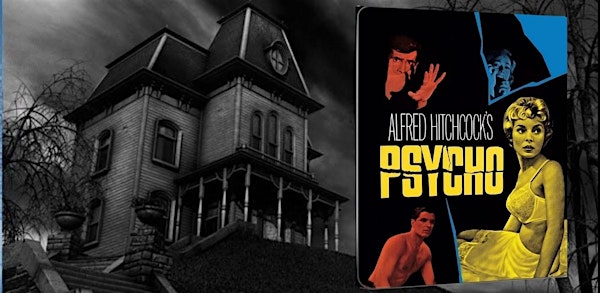Psycho (1960)

“Psycho,” directed by the legendary Alfred Hitchcock and released in 1960, is widely regarded as a landmark in the horror genre. Based on the novel by Robert Bloch and adapted by Joseph Stefano, this psychological thriller has left an indelible mark on cinema, influencing countless filmmakers and redefining the boundaries of horror storytelling. With its chilling narrative, unforgettable performances, and innovative techniques, “Psycho” remains a quintessential work that captivates audiences to this day.
The film opens with Marion Crane, portrayed by the talented Janet Leigh, a secretary who dreams of a better life. She impulsively steals a substantial amount of money from her employer to start anew with her lover, Sam Loomis, played by John Gavin. This act of desperation sets the stage for the unfolding horror. Marion’s journey takes her to a remote motel owned by the enigmatic Norman Bates, played by Anthony Perkins. The Bates Motel, nestled in the shadow of a foreboding old house, serves as a symbol of isolation and secrecy, creating an atmosphere ripe for tension and dread.
One of the film’s most iconic sequences occurs when Marion takes a shower. This scene, famously accompanied by Bernard Herrmann’s haunting score, features quick cuts and striking close-ups, making it one of the most memorable moments in cinematic history. The sudden violence and the shock of Marion’s murder not only subvert audience expectations but also redefine the role of the protagonist in a narrative. Hitchcock’s bold choice to kill off a seemingly central character so early in the film left viewers reeling and set the tone for the psychological unraveling that follows.
Anthony Perkins’ portrayal of Norman Bates is a masterclass in performance. He embodies the character’s duality with remarkable nuance—at once charming and deeply troubled. Bates is a complex figure, struggling with his identity and haunted by the influence of his overbearing mother. The relationship between Norman and his mother is central to the film’s psychological exploration, delving into themes of obsession, guilt, and the impact of a toxic upbringing. Perkins’ ability to convey vulnerability and menace simultaneously makes Bates one of the most compelling and chilling characters in film history.
The character of Lila Crane, played by Vera Miles, adds another layer to the narrative. As Marion’s sister, she becomes increasingly determined to uncover the truth behind her sister’s disappearance. Her investigation leads her to confront the dark secrets of the Bates family, culminating in a tense and climactic revelation that unveils the true nature of Norman Bates and his relationship with his mother.
Hitchcock’s direction is marked by meticulous attention to detail and innovative techniques that heighten the film’s suspense. The use of black-and-white cinematography enhances the stark contrasts between light and shadow, emphasizing the psychological tension throughout the film. The carefully crafted set design, particularly the Bates Motel and the eerie, decaying house on the hill, adds to the film’s unsettling atmosphere, making the audience feel a sense of dread and foreboding.

Moreover, the film’s score, composed by Bernard Herrmann, is a crucial element in creating its haunting ambiance. The shrill strings that accompany the shower scene and other moments of tension elevate the emotional impact, making the viewer acutely aware of the danger lurking beneath the surface.
“Psycho” also explores themes of identity and the fragility of the human psyche. The film raises profound questions about sanity, the effects of trauma, and the complexities of human behavior. Norman Bates represents the dark side of human nature, serving as a reminder of how easily one’s mind can become fractured under the weight of guilt and repression.

The film’s legacy extends beyond its immediate impact; it has influenced countless works in the horror genre and popular culture. Its innovative narrative structure, shocking twists, and psychological depth have inspired generations of filmmakers. “Psycho” paved the way for more sophisticated horror films, challenging the conventions of the genre and encouraging audiences to confront their deepest fears.

In conclusion, “Psycho” is a seminal work in the realm of psychological horror that continues to resonate with audiences. Alfred Hitchcock’s masterful direction, coupled with Anthony Perkins’ haunting performance and a score that has become iconic, cements the film’s status as a timeless classic. With its exploration of the darker aspects of human nature, “Psycho” transcends mere entertainment, inviting viewers to reflect on the complexities of identity and the fragility of sanity. It remains a powerful testament to the art of filmmaking and the enduring impact of storytelling in cinema.











